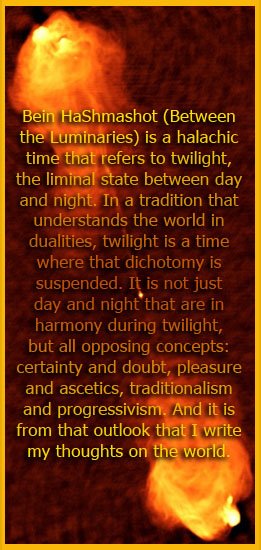
Last night I was intending to see this really cool documentary at the
Pacific Film Archive called
The Decline of Western Civilization (with the director present) about Punk in the early 80's, but it was sold out. So after some discussion, we headed over to pay 10 bucks for Adam Sandler's new movie about an Israeli hair dresser.
I'll admit, it was exactly what I expected it to be. It was incredibly stupid with some funny slapstick and we were the only ones in the theater laughing at the Israeli jokes. But one thing that I didn't expect to see (although I guess I should have) was all the horrendous stereotyping that went on throughout the film. I didn't like constant use of the word feygele to make fun of hair dressers (yet a fair criticism of the macho attitude of Israeli society), and the terrible way that Palestinians were portrayed.
Jack Shaheen is having a field day with this movie.
At the beginning there was a funny bit of dialogue that showed that the makers of the movie weren't total Islamophobic idiots. As Zohan, the superhuman Israeli counter-terrorism commando, has a fight scene with Hamas terrorists, in between punches in kicks they begin to argue about the conflict saying, "you know, its not so cut and dry, we've been here for a long time" "Right, and there were never any Jews in the Middle East." After hearing that exchange I had false hopes that the movie would continue with witty, intelligent humor instead of Sandler's usual poo poo jokes, but I was wrong. I should have remembered that movies like this are funny for the first ten minutes in order to hook you, and then they just get stupid.
They started blurring the lines between Arab and Palestinian, at some points given them Saudi head coverings, confusing the Lebanese flag with the Palestinian flag, and persisting the Arab stereotypes that have been going on since the beginning of Hollywood. The writers must have done their homework. I can just see them
watching Lawrence of Arabia, taking notes, and saying, "Yeah, thats offensive and inaccurate, let's add that to the storyboard." Having the evil Palestinian leader surrounded by a harem of belly dancers and making the Arabs so incompetent that they couldn't figure out how to make a bomb, forcing them to call the Hizbollah hotline, must have been taken straight out of
Arabs in American Media 101.
I understand that stereotypes are funny and that they are an easy way to introduce a character in a short period of time, but we shouldn't be trying to persist those stereotypes. It is movies like these that lead to the
experience that I had in the airport in Detroit. Producers should start focusing less on "how can we make the most money with the least amount of thought" and more on "how can we make a great movie that will be funny for a mainstream audience."
Even comedic movies that focus on stereotypes can be made intelligent. Take Borat, for example. It was a smart film because they used stereotypes to poke fun at the kind of people who use and believe these stereotypes. So although there were parts of the movie that seemed anti-semitic, in reality they were making fun of anti-semites and may have even opened peoples consciousness to antisemitism. We need more
Sacha Baron Cohen films.



 RSS Feed (xml)
RSS Feed (xml)


